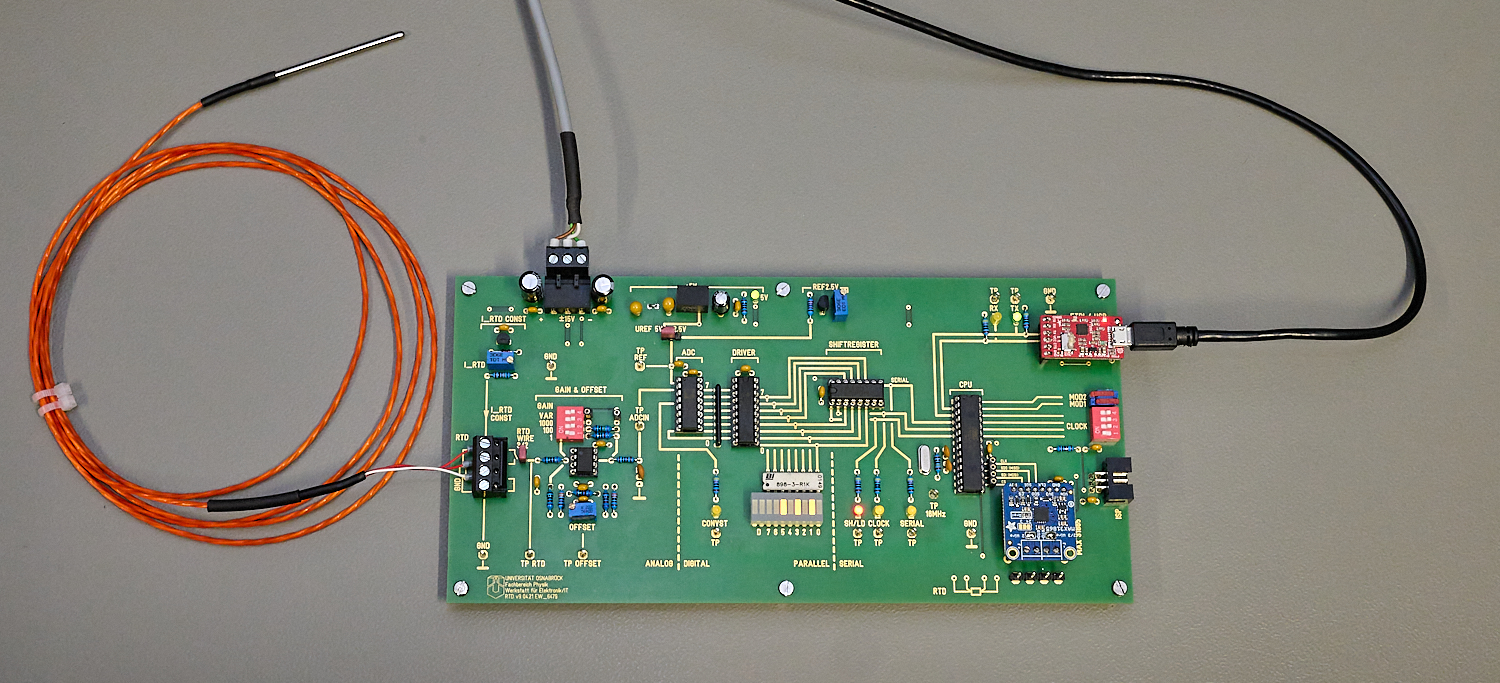Hauptinhalt
Topinformationen
Teaching
Digital signal- and measurement data processing [PHY-EV-V-G]
Modern physical experiments rely at a progressive rate on digital signal processing. Consequently, the realisation of physical experiments as well as the interpretation of resulting measurement data requires an in-depth understanding of the different steps in the signal processing pipeline.
This course (lecture with practical exercises) covers following main topics:
- physical measurement and digital representation of physical data
- sampling and the sampling theorem
- spectral analysis
- discrete-time systems and z-transform
- digital filters
- applications in physical experiments
The course includes practical exercises which are based on two specifically developed boards:
- RTD board: A circuit comprising all steps from an analogue measurement to the digital output. The digital processing is realised around an ATmega 328P microcontroller, identical to the processor used for the Arduino Uno.
- DSMV board: A circuit for real-time digital signal processing. High-quality AD (20bit / 32bit) and DA (20bit) converters are connected to a Cortex-M7 microcontroller (using a Teensy 4.0).
The course is offered in summer term.
Stud.ip links for summer term 2025: lecture & exercises
Previous years: summer term 2024: lecture & exercises ; summer term 2023: lecture & exercises ; summer term 2022 ; summer term 2021 ; summer term 2020.
The course will be given in either german or english language.
Course materials are available via stud.ip.
Code is available via GitLab@UOS (previously via GitHub) and pypi.
Machine learning in scanning probe microscopy [PHY-AFM-S]
There is currently increasing activity in exploiting machine learning techniques to bring artificial intelligence into the field of scanning probe microscopy - and to the field of surface science in general.
This seminar will discuss recent approaches on combining machine learning with scanning probe microscopy. The literature can roughly be separated into
- approaches for instrument control and automatisation (in particular tip preparation, autonomous scanning, and manipulation)
- experimental data analysis (including feature recognition as well as molecular identification)
- methods for generating and analysing simulated data (such as analysis of complex simulated data and generation of learning data sets).
The seminar will consist of an introduction into machine learning techniques (2 lessons) and an overview of scanning probe microscopy. The reminder of this seminar will consist of talks given by the participants on above topics that summarise current literature.
Stud.ip link: summer term 2024: seminar
The course will be given in either german or english language.
Course materials are available via stud.ip.
Non-contact atomic force microscopy [PHY-NCAFM-15]
The imaging and manipulation of single atoms and molecules is nowadays possible by using scanning probe methods, in particular the technique of non-contact atomic force microscopy (NC-AFM) enables the investigation of non-conducting surfaces.
This lecture covers following main topics:
- quantitative atomic force microscopy
- physical description of NC-AFM
- technical aspects of NC-AFM systems
- quantitative force measurements
- examples and current research topics
Stud.ip links: summer term 2019: lecture & seminar ; summer term 2018: lecture & seminar ; summer term 2017: lecture & seminar
The course will be given in either german or english language.
Course materials are available via stud.ip.




